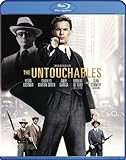Gangster Squad struggles to find its tone

‘Gangster Squad’ harkens back to the gangster flicks of the 50s and 60s, but in a way that leaves you wishing you’d watched one of those flicks on Turner Classic Movies instead of spending an evening at the cineplex.
I think I liked Gangster Squad for all of the wrong reasons. I believe director Ruben Fleischer intended the flick to be a modern, violent version of the gangster movies of the 50s and 60s. Instead, I only began truly enjoying the film when I embraced the movie as camp – maybe not as tongue-in-cheek as the 60s Batman television show, but camp non-the-less. I actually turned to a colleague of mine at the film’s screening and asked if the story was based on a graphic novel that I perhaps hadn’t heard of; that if the source material could come from that type of surreal genre, maybe I could understand and appreciate the flick as intended a little better.
Gangster Squad lives in this space that’s somewhere between films like The Untouchables, Sin City and Reservoir Dogs while being absolutely nothing like them. The film really tries to be Dick Tracy in a post-Tarantino world, but doesn’t have the stomach to go all in with the graphic nature of its violence. There is a moment very early in the film where a mob execution is handled in an incredibly graphic way, that even as the camera pulled back from the action just at the pivotal moment, put the audience on notice for what kind of film it was going to be … only to never fulfill that promise.
The story is almost criminally straightforward. Josh Brolin is Sgt. John O’Mara, an honest Los Angeles cop tasked with building an off-the-books team to take down ruthless mobster Mickey Cohen (Sean Penn). Cohen has violently seized control of LA, and is putting the final pieces in place to control the gambling books for the entire west coast. Brolin’s team, played by Giovanni Ribisi, Anthony Mackie, Michael Peña and Robert Patrick, is neither top-notch nor experienced. Their first attempt at putting a dent in Cohen’s operation goes so badly, several of them are arrested in a neighboring county. How this team evolves into something that can take down such a connected gangster never feels believable.
The story itself is as paint-by-numbers as Penn’s antagonist is cliché. As the team comes together, it is immediately apparent which member will make the Agent Coulson-esque sacrifice that pushes the team to complete their mission at any cost. O’Mara’s Army background – including training and serving with a “classified” unit – is apparently enough to give him the confidence to walk into one of Cohen’s brothels and take a building’s worth of lackeys – many at the same time – yet we’re supposed to believe the film’s climax will tax him beyond breaking a sweat. The film introduces his wife as a strong, intelligent woman who helps put together the team, and then shuffles her to the background for the rest of the film. I’d have much rather seen her lead the troops in taking down Cohen. Very little involving John O’Mara is compelling.
Maybe I’m a product of my own bias, but the film’s only bright spot came from Ryan Gosling and Emma Stone. Gosling is Jerry Wooters, the reluctant final member of O’Mara’s team and Stone is Mickey Cohen’s “lady-friend” Grace Faraday … whose on-the-side relationship with Wooters stood to blow the entire case on several occasions. I am an unabashed fan of Stone, and her chemistry with Gosling had proved solid previously in Crazy, Stupid, Love. While the narrative never explored their relationship as much as it could have, the movie always picked up momentum when they were on-screen, or when either character was interacting with Wooters’ gangster friend Jack Whalen (Strike Back’s Sullivan Stapleton, doing quite a bit with little material).
Unfortunately, I think audiences will be expected to take Gangster Squad seriously, instead of writing it off as camp as I did. The film is violent – but again not graphically so – including the infamous scene re-shot in the wake of the Aurora Movie Theater shootings (the film originally included an ambush/shoot-out in a movie theatre, but was changed to an attack in Chinatown). Considering the film could never make up its mind in that regard, it was tough to give weight to the action; when characters die, it is not easy figuring out if we were supposed to react emotionally. All things considered, that’s not the mark of a good flick.
 CliqueClack
CliqueClack



